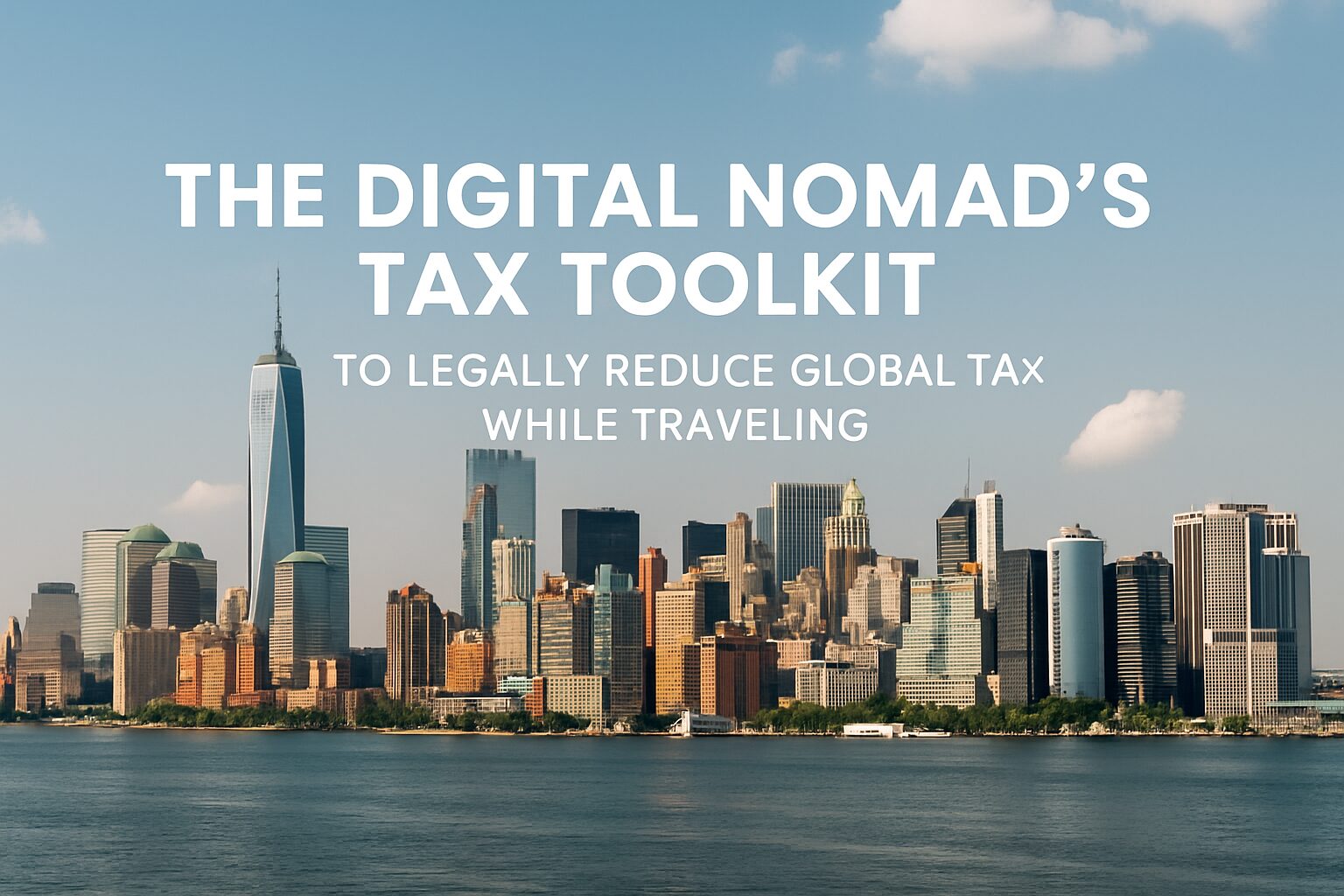A Practical Guide to Structuring Income, Using Treaties, and Keeping More of What You Earn
1. Why Taxes Matter More Than Ever for Digital Nomads
Living a location-independent lifestyle offers freedom—but it doesn’t free you from taxes. In fact, as a digital nomad or remote freelancer, your tax situation becomes more complex, not less.
Many nomads make the mistake of assuming:
“If I’m traveling, I don’t owe tax anywhere.”
Wrong.
In reality, you could owe taxes in:
- Your home country
- Your country of residence (even temporarily)
- A third country where your clients are located
Without a clear strategy, you could end up paying double taxes, facing audits, or losing access to legal systems. But with the right setup, you can legally minimize your tax burden while remaining 100% compliant.
2. Understand the Three Layers of Global Tax
To optimize your tax situation, you need to address three main components:
✅ A. Tax Residency
Each country defines tax residency differently. Most use the 183-day rule:
Stay in the country for more than 183 days in a year? You’re likely a tax resident.
Other countries apply economic ties, habitual residence, or even center of vital interests to determine your status.
✅ B. Source of Income
Where your income is generated can affect your tax exposure.
- If your client is in the U.S., the U.S. may tax you on that income
- If you’re living in Germany, they may tax your income even if your clients are overseas
- Your home country may claim rights to your global income unless you properly disconnect
✅ C. Entity Structure
How you legally structure your freelance income (as an individual, LLC, LTD, etc.) determines:
- Where you file
- What deductions you can claim
- Whether you’re personally liable
3. Best Countries for Digital Nomad Tax Optimization
Some countries offer favorable tax treatment, especially if you’re earning remotely and don’t establish strong local economic ties.
| Country | Tax Benefit | Ideal For |
|---|---|---|
| 🇵🇹 Portugal | NHR program: flat tax or exemptions | EU citizens, high-income nomads |
| 🇬🇪 Georgia | 1% income tax for small businesses | Freelancers & consultants |
| 🇦🇪 UAE | No income tax | Wealthier entrepreneurs |
| 🇲🇺 Mauritius | Tax holidays under Premium Visa | Long-stay nomads |
| 🇹🇭 Thailand | LTR Visa + BOI tax perks | Tech founders & startup owners |
| 🇪🇪 Estonia | E-Residency, deferred corporate tax | Remote-first startups & digital freelancers |
These countries make it easier to separate your income, reduce taxes legally, and access banking + billing tools.
4. Set Up a Tax-Efficient Business Structure
Creating the right business structure can drastically lower your tax obligations and increase legitimacy.
✅ Popular Structures for Nomads
| Entity | Jurisdiction | Pros | Cons |
|---|---|---|---|
| LLC (U.S.) | Wyoming, Delaware | Simple, accepted globally | U.S. reporting rules apply |
| LTD (UK) | United Kingdom | Prestige, EU compatibility | Director reporting required |
| Sole Prop | Anywhere | Low setup cost | High personal liability |
| Estonian OÜ | Estonia | Digital management, tax deferral | Must understand Estonian rules |
Choose an entity that:
- Aligns with your residency
- Supports global banking
- Provides access to invoicing + contracts
5. How to Avoid Double Taxation
Most countries sign double taxation agreements (DTAs) to prevent you from being taxed twice on the same income.
Use these steps:
- Know your treaty benefits
Example: The U.S. has DTAs with over 60 countries. France, South Korea, Japan, and Canada are just a few. - File properly in each country
Even if you owe zero tax in one country, you often still need to file. - Use the Foreign Earned Income Exclusion (FEIE)
U.S. citizens can exclude up to ~$120,000/year (check the current figure) of foreign-earned income if they meet:- Bona fide residence test OR
- Physical presence test (330 days abroad)
- Work with an international tax expert
Taxes are not DIY when you live in 3+ countries per year.
6. Real Examples: Nomads Saving Money Legally
🇨🇦 Designer based in Georgia
- Registered as small business under 1% tax regime
- Clients in U.S. and EU
Saved over $10,000/year in taxes legally
🇩🇪 Developer based in Thailand
- Used BOI-approved tech visa + LTD in UK
Paid flat 5% business tax, no personal tax
🇺🇸 U.S. citizen living in Portugal
- Qualified for FEIE + Portugal’s NHR
Avoided double taxation, paid only 15% flat rate
7. Tools & Resources Every Nomad Should Use
- Xolo, Remote.com, Deel – Global payroll and compliance
- Wise, Payoneer, Revolut Business – Banking for global freelancers
- QuickBooks, Xero – Bookkeeping and invoicing
- Nomad Capitalist, Tax Scouts, Healy Consultants – Setup + tax optimization services
8. Compliance Tips: Stay Legal While Paying Less
Keep personal and business accounts separate
File taxes even when you don’t owe
Keep contracts and client invoices for every deal
Don’t overstay in one country without checking tax impact
Monitor residency rules in real-time (especially during COVID extensions or visa overlaps)
9. Final Word: You Can Pay Less Tax — the Legal Way
Tax optimization isn’t about hiding money. It’s about understanding global systems and using them legally.
As a digital nomad:
- You don’t have to pay tax everywhere
- You must pay somewhere—and pay right
When structured properly, remote work can give you freedom AND financial efficiency.
📌 Coming Up Next
“How to Open a Global Business Bank Account as a Digital Nomad – No Local Address Needed”
→ Discover the best online banks for remote workers, how to open without residency, and where to receive global payments.
